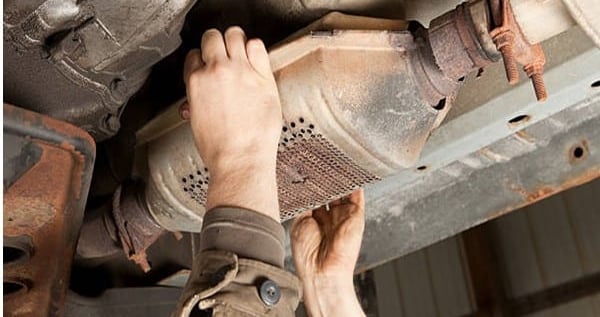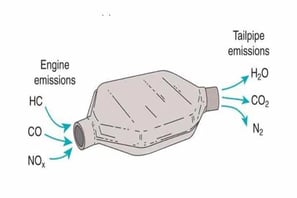4 Best Ways To Prepare Your Catalytic Converters for Scrap: A Comprehensive Guide for Car Owners
How to Maximizing Your Catalytic Converter's Scrap Value:
SCRAP YARDJUNK YARD
Scrap Yard Near Me
6/26/20234 min read


Introduction
If you are not totally in the market and looking to get cash for my junk car you have other options to consider. As a car owner, you know that maintaining your vehicle's performance and efficiency is crucial. One essential component that helps with this is the catalytic converter. However, over time, this part can wear out and require replacement. When that time comes, you might wonder if you can make some money by selling the old converter as scrap. The answer is yes! With proper preparation, you can maximize the value of your catalytic converter and put some extra cash in your pocket. In this comprehensive guide, Scrap Yard Near Me will explore four ways to prepare your catalytic converters for scrap, ensuring you get the best possible return on your investment.
How Does It Work:
Before diving into the preparation process, it's essential to understand what a catalytic converter is and its role in your vehicle. A catalytic converter is a device that reduces harmful emissions from your car's exhaust by converting them into less harmful substances. It achieves this through a chemical reaction facilitated by a honeycomb-like structure coated with precious metals such as platinum, palladium, and rhodium. It's these precious metals that give catalytic converters their value in the scrap market.
Now that you have a basic understanding of what a catalytic converter is and why it's valuable, let's look at the four ways to prepare your catalytic converters for scrap:
1. Research and Identify Your Catalytic Converter Know Your Stuff:
Before you can sell your catalytic converter as scrap, it's crucial to gather some information about it. Start by researching the make, model, and year of your vehicle, as well as the type of converter it has. There are different types of catalytic converters, such as two-way, three-way, and diesel oxidation converters, which can affect their value. Additionally, knowing the specific vehicle information can help you compare prices and negotiate with scrap dealers.
Locate the serial number on your catalytic converter, which is usually stamped on the outer shell. This number will help you identify the manufacturer and the type of converter you have. You can look up the serial number online to find more information about your specific converter and its potential value in the scrap market.
Take clear photos of your catalytic converter, including the serial number and any markings or logos. These images will be useful when discussing your converter with scrap dealers and will help you prove the authenticity and condition of your converter.
2. Determine If Your Catalytic Converter Is The Original or Aftermarket –It Will Make A Big Difference In The Price You Get:
Another critical factor that affects the value of your catalytic converter is whether it's an original equipment manufacturer (OEM) or aftermarket converter. OEM converters are installed by the car manufacturer and tend to have a higher concentration of precious metals, making them more valuable. Aftermarket converters, on the other hand, are replacement parts made by third-party manufacturers and generally have a lower value.
You can determine if your catalytic converter is OEM or aftermarket by examining its appearance and markings. OEM converters typically have the car manufacturer's logo or name on them, while aftermarket converters may have the name of the third-party manufacturer. Additionally, OEM converters often have a more polished appearance and higher-quality construction than aftermarket converters.
Be prepared to disclose this information to scrap dealers, as it will significantly impact the price they offer for your converter. Being transparent about whether your converter is OEM or aftermarket will also help establish trust and credibility with the dealer, making the transaction smoother and more successful.
3. Leave the Honeycomb Structure Intact, Don’t Remove It:
While it may be tempting to remove the honeycomb structure from your catalytic converter to access the precious metals, doing so can significantly reduce its value. Scrap dealers prefer to buy catalytic converters with the honeycomb still intact, as it makes it easier for them to extract the metals and ensures that no precious material has been removed beforehand.
When preparing your catalytic converter for scrap, ensure that the honeycomb is undamaged and free from debris or contaminants. Clean the outer shell of the converter to remove any dirt and grime, but avoid using any harsh chemicals or abrasive tools that could damage the honeycomb.
By leaving the honeycomb intact, you demonstrate to scrap dealers that you have not tampered with the converter, making it more likely that they will offer you a fair price for your scrap.
4. Remove Excess Material from the Catalytic Converter Like Exhaust Pipe:
Before selling your catalytic converter as scrap, it's essential to remove any excess material, such as attached exhaust pipes or brackets. Scrap dealers are primarily interested in the converter itself and the precious metals it contains, and any additional material can lower the overall value of your scrap.
Use a saw or cutting tool to carefully remove the exhaust pipes and any other attachments from the catalytic converter. Be cautious not to damage the converter itself, as this could negatively impact its value. Wear proper safety equipment, such as gloves and eye protection, while cutting the pipes to protect yourself from injury.
By removing excess material, you make your catalytic converter more appealing to scrap dealers and increase the likelihood of receiving a higher price for your scrap.
Conclusion
Preparing your catalytic converters for scrap doesn't have to be a daunting task. By following these four steps – knowing your information, determining if your converter is OEM or aftermarket, leaving the honeycomb intact, and removing excess material – you can maximize the value of your scrap and make the process smoother for both you and the scrap dealer. By taking the time to properly prepare your catalytic converter, you not only contribute to the recycling of valuable materials but also put some extra cash in your pocket. Contact us today to experience the Junk Yard difference.


Service Locations:
Copyright 2024: Scrap Yard Near Me - All Rights Reserved
Powered By: Digital Intent Marketing



